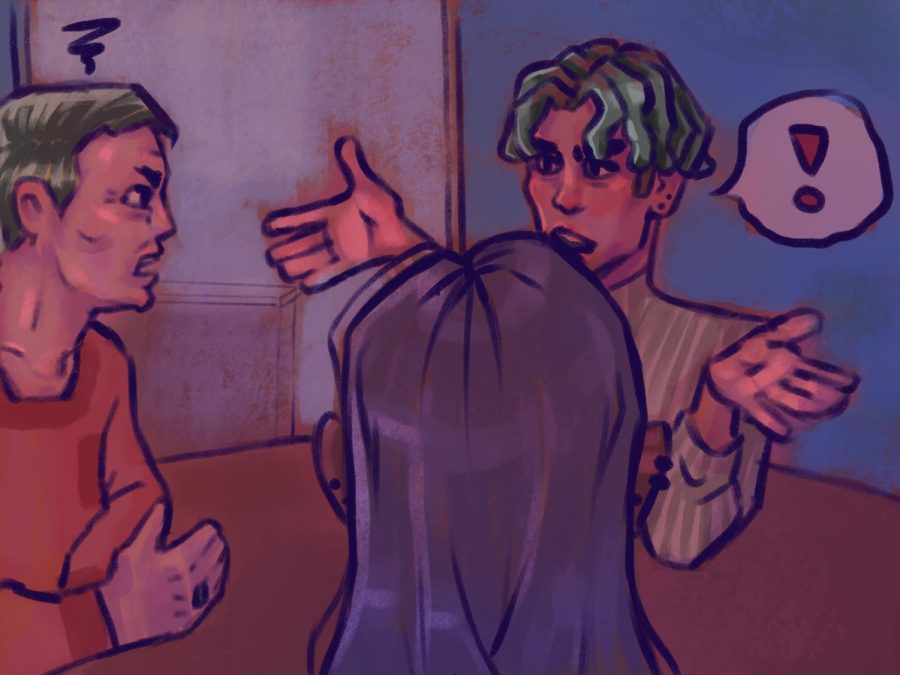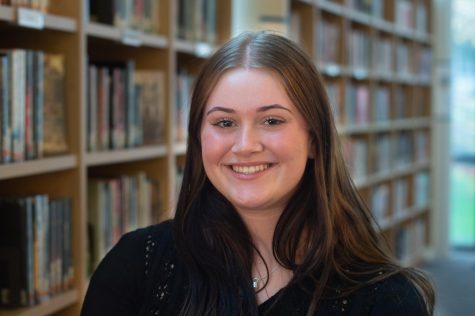Political Issues Are Never Cut and Dry: How the 2020 Election Changed My Family’s Dynamic
“Remember that you’re disagreeing with the person about a certain topic, you’re not trying to go to battle against this particular individual,” psychologist Matthew Buckley said.
December 16, 2020
For millions of Americans, the 2020 presidential election brought a dramatic rollercoaster of emotions. With the two-party system seeming to drive a wedge between us even further than typical elections, at times, handling differences in opinions seems to become more than stressful.
My parents have never been politically invested people, or had extreme right-leaning or left-leaning views. Even when they have felt strongly about something, they have used caution when teaching me about important issues so I could learn to think for myself and form my own opinions.
The first election I vividly remember was the 2012 Obama vs. Romney race. At nine years old, I worshipped the ground my parents walked on, so whoever they wanted to win, I trusted their choice.
Once I started high school, I began to care more about politics than I had before. This newfound interest was driven by what I saw as a moral obligation to care about what kind of person the president was.
With both candidates in the 2020 election facing monumental amounts of criticism and disapproval from both extremes of the political spectrum, it seemed to me at times that people were choosing to vote for who they believed was the lesser of two evils.
My family began to have varying views on who was best suited for the title of “President.”
Dinner conversations gradually turned from a light discussion about our day and maybe a debate over a couple of news headlines to yelling and shedding tears over civil rights issues. Our persistent outspokenness proved to end with clashing thoughts tumbling over each other into a messy pile on the kitchen table.
I found myself lashing out at my parents in ways I never had before. Aside from the typical disagreements teens and parents have with one another, my parents and I don’t usually fight, at least not in a manner that left me feeling as despondent and regretful as these political disagreements would.
I couldn’t decide if these discussions were actually bad or just a part of the coming-of-age process I happen to be enduring in the midst of a transitional period in our world. From the wrath of the pandemic to the historic protests following police brutality cases, there is no question that we’re living in a time outside of the ordinary.
The emotional stressors brought upon millions through the uncertainties of 2020 have drawn many closer to their families than ever. In a time where I was isolated and needed my family to keep me afloat, I felt more lonely than ever.
These hurtful arguments made me question how I could come to a center of peace with people I disagreed so strongly with. Struggling to grasp the idea that toning down the vocality of my beliefs might be the only solution, I scraped my mind for alternative ways to heal my now-wounded relationship with my parents.
Once the election finally came and went, our relationship had reached a point of civility, but the tension between us was still present. I didn’t feel comforted by our new ability to congregate semi-peaceably, but rather worried that things would always have to be this way — an awkward in-between.
I’m still learning how to accept that differences in opinions should not hinder my ability to create civil relationships with people. As much as I wish I could live in a world where everybody sees people’s rights the same way that I do, that is far from the reality.
Opening my mind to the idea that there are so many more opinions than just mine or just my parents’ helped me to better appreciate their feelings. Despite the obvious two-party system in the U.S., there are so many different viewpoints falling between the right and left extremes.
Political issues are never black and white, and thinking with that mindset leaves people no opportunity for growth.
Psychologist Matthew Buckley said, “Instead of trying to aggressively dominate the other person with your opinion, and arbitrarily dismiss their opinion in the process, try to understand their opinion and perspective on the matter.”
This approach not only offers respect to the other person engaging in the conversation, but also provides you with an opportunity to change or better articulate your own opinion.
While my family and I will probably never see eye to eye with each other in matters of politics, going through this rough patch with them allowed me to see the importance of having them in my life.
No good will ever come from us holding grudges against each other for things we don’t wish to change. Despite the major contrast in our opinions, I know that they’re the reason I feel confident opening up about my views.
I’ve since learned that my strength is found in my parents’ need to support me even when they’re disappointed in my choices. They will always love me and I will always love them, which outweighs any fight or disagreement we could have.





